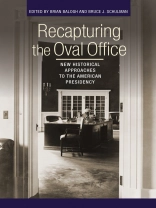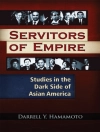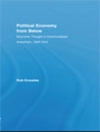Several generations of historians figuratively abandoned the Oval Office as the bastion of out-of-fashion stories of great men. And now, decades later, the historical analysis of the American presidency remains on the outskirts of historical scholarship, even as policy and political history have rebounded within the academy. In Recapturing the Oval Office, leading historians and social scientists forge an agenda for returning the study of the presidency to the mainstream practice of history and they chart how the study of the presidency can be integrated into historical narratives that combine rich analyses of political, social, and cultural history.The authors demonstrate how ‘bringing the presidency back in’ can deepen understanding of crucial questions regarding race relations, religion, and political economy. The contributors illuminate the conditions that have both empowered and limited past presidents, and thus show how social, cultural, and political contexts matter. By making the history of the presidency a serious part of the scholarly agenda in the future, historians have the opportunity to influence debates about the proper role of the president today. Contributors: Brian Balogh, University of Virginia; Michael A. Bernstein, Tulane University; Kathryn Cramer Brownell, Purdue University; N. D. B. Connolly, The Johns Hopkins University; Frank Costigliola, University of Connecticut; Gareth Davies, University of Oxford; Darren Dochuk, Washington University; Susan J. Douglas, University of Michigan; Daniel J. Galvin, Northwestern University; William I. Hitchcock, University of Virginia; Cathie Jo Martin, Boston University; Alice O’Connor, University of California, Santa Barbara; Bruce J. Schulman, Boston University; Robert O. Self, Brown University; Stephen Skowronek, Yale University
表中的内容
Introduction: Confessions of a Presidential Assassin
by Brian Balogh Part I. Balancing Agency and Structure 1. The Unsettled State of Presidential History
by Stephen Skowronek2. Personal Dynamics and Presidential Transitions: The Case of Roosevelt and Truman
by Frank Costigliola3. Narrator-in-Chief: Presidents and the Politics of Economic Crisis from FDR to Obama
by Alice O’Connor Part II. The Social and Cultural Landscape Presidents Confront 4. The Reagan Devolution: Movement Conservatives and the Right’s Days of Rage, 1988–1994
by Robert O. Self5. There Will Be Oil: Presidents, Wildcat Religion, and the Culture Wars of Pipeline Politics
by Darren Dochuk6. Ike’s World: Ideology and Power in Eisenhower’s National Strategy
by William I. Hitchcock7. Black Appointees, Political Legitimacy, and the American Presidency
by N. D. B. Connolly8. Presidents and the Media
by Susan J. Douglas9. The Making of the Celebrity Presidency
by Kathryn Cramer Brownell Part III. The Presidency and Political Structure 10. Stand by Me: Coalitions and Presidential Power from a Cross-National Perspective
by Cathie Jo Martin11. Taking the Long View: Presidents in a System Stacked against Them
by Daniel J. Galvin12. American Presidential Authority and Economic Expertise since World War II
by Michael A. Bernstein13. The Changing Presidential Politics of Disaster: From Coolidge to Nixon
by Gareth DaviesConclusion: The Perils and Prospects of Presidential History
by Bruce J. SchulmanNotes
List of Contributors
Index
关于作者
Brian Balogh is the Compton Professor at the Miller Center and the Corcoran Department of History at the University of Virginia. He is the author of A Government Out of Sight: The Mystery of National Authority in Nineteenth-Century America and editor of Integrating the Sixties: The Origins, Structure and Legacy of a Turbulent Decade. Bruce J. Schulman is the William E. Huntington Professor of History at Boston University. He is the author of From Cotton Belt to Sunbelt: Federal Policy, Economic Development, and the Transformation of the South, 1938–1980; Lyndon B. Johnson and American Liberalism: A Brief Biography with Documents; and The Seventies: The Great Shift in American Culture, Society, and Politics.












